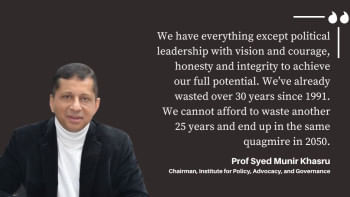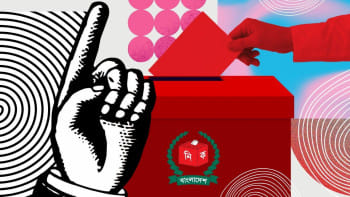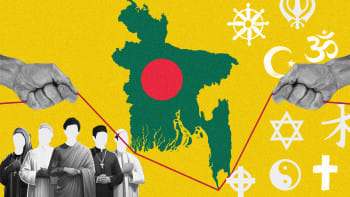Six months of the interim government: Bangladesh stands at a critical crossroads

Chief Adviser Prof Muhammad Yunus announced in December last year that the next general election might take place at the end of 2025 or in the first half of 2026, depending on political consensus and reforms. His government, which took over after Sheikh Hasina's ouster on August 5, formed at least 15 reform commissions. However, six months in, the interim government finds itself navigating troubled waters, surrounded by complex socioeconomic, political, and governance challenges that threaten to overshadow its initial promises.
Economic struggle and the crisis of confidence
The interim administration inherited a fragile financial landscape marked by high inflation, a banking sector in crisis, and dwindling foreign exchange reserves. Inflation eased to 9.94 percent in January from 10.89 percent in December, driven by stable food prices due to an influx of winter vegetables. Despite this decline, inflation has remained above nine percent since March 2023, causing hardships for fixed-income and low-income people.
Following criticism over recent hikes, the National Board of Revenue (NBR) revised down VAT and supplementary duty on some items. The VAT adjustments follow IMF recommendations under a $4.7 billion loan programme, pushing for tax reforms at the expense of public well-being to increase revenue collection. The banking sector, long plagued by bad loans and financial mismanagement, has seen some positive steps, such as asset quality reviews and hiring of international auditors to clean up failing banks. The government has worked to curb illicit financial outflows estimated to be $16 billion annually under the previous regime.
Foreign direct investment dropped to a six-year low in the July-September quarter of FY25, reaching only $104.33 million, a 71 percent decline from FY24. Net equity investment fell by 46 percent to $76.79 million, while reinvested earnings dropped by 73 percent to $72.9 million. The decline has been driven by political unrest, labour agitation, inflation, import restrictions, dollar shortages, and weak law and order. Investors remain wary due to uncertainty over political transitions, economic mismanagement, and inconsistent policies.
Law and order, reform and good governance
Law and order remain one of the most critical aspects. While the administration has attempted to restore stability following months of violent protests, crime rates have surged. Sharp rise in political violence, robberies, and extortion has been exacerbated by a weakened police force recovering from the post-uprising trauma and restructuring.
Violent crime, particularly murder and mugging, has created fear, especially in the evenings. Despite increased patrolling and intelligence surveillance, police efforts have not significantly curbed crime rates. Murder cases surged in 2024, with 583 in September, 399 in October, and 337 in November, whereas in the same months in 2023, the numbers were significantly lower at 238, 258, and 227, respectively. Muggings have escalated as armed gangs target victims in alleys and even in broad daylight.
While the interim government has exposed past human rights violations, including enforced disappearances, allegations of politically motivated arrests and reprisals have raised concerns about the government replicating some of the sametendencies. While no significant extrajudicial killings have been reported, the recent death of a BNP youth front activist in the custody of security forces has fuelled fears that old patterns may be re-emerging.
The interim government formed 11 inquiry teams to investigate corruption allegations against the family members of Sheikh Hasina and 10 major industrial groups, including S Alam, Beximco, Bashundhara, and Summit. The Anti-Corruption Commission (ACC) is leading the investigation, with support from other agencies like the NBR and CID. There is a lack of transparency on the progress of the investigations, and no timeline or public update on how these investigations are being conducted or their effectiveness.
Though it has aggressively pursued investigations into the previous government's misdeeds, the interim government has been less proactive in tackling corruption and unrest happening under its tenure. The administration's tendency to cherry-pick aspects that require reform has raised concerns on the intent and efficacy of the reform commissions. In absence of any meaningful conversation with political parties, who will ultimately have to agree to implement the proposed reforms, the commission reports will be another academic paper gathering dust.
Protests, gridlock, and disruptions
Since August 5, ongoing traffic disruptions in Dhaka due to relentless protests have brought the city's mobility to a grinding halt, making daily commute a struggle for millions. One such recent disruption came from the students of Government Titumir College, who staged multiple road blockades demanding university status for their institution. On January 30, they obstructed both sides of the road in front of their campus and at the Gulshan 1 intersection, causing hours-long congestion that left commuters helpless. Protests also extended to rickshaw drivers who blocked roads to ban battery-run powered rickshaws, only for battery-run rickshaw drivers to stage counter-protests when a High Court ruling restricted their operations.
Efforts by the Dhaka Metropolitan Police (DMP), which include deployment of 4,200 officers, have had little impact. Between September and December alone, the DMP issued over 139,000 traffic violation cases and confiscated thousands of illegal rickshaws, yet the gridlock persists. The capital city risks descending into complete chaos, where every day is dictated by yet another protest and another gridlock.
The failure of the National Curriculum and Textbook Board (NCTB) to timely distribute textbooks caused frustration, leaving parents and children bewildered. By mid-January, only 37 percent of 40.15 crore textbooks were delivered, disrupting primary and secondary education. This fiasco places the government in a negative light as the previous government had a good track record of delivering the books on time.
July uprising victims plagued by red tape
Victims of the July uprising continue to suffer as compensation remains caught up in bureaucratic red tape. Although the government pledged Tk 5 lakh for families of martyrs and Tk 1 lakh for the injured, disbursement is hindered by tedious verification procedure. Families are forced to make repeated visits, only to face rejection due to minor discrepancies or the unavailability of officials.
Limited staffing of the July Shaheed Smrity Foundation, with only 35 employees, has exacerbated delays, making it difficult for applicants to receive timely support. Inefficiency and slow processing has pushed affected families into financial distress, forcing them to struggle for survival while their applications remain unresolved.
Strained ties with India and scepticism
While India's narrow focus on backing Hasina rather than engaging with Bangladesh's broader political spectrum has been a strategic mistake, the resulting growth of anti-India sentiment in Bangladesh is also worrying and counterproductive as we have to find ways for constructive engagement with our largest neighbour. A stable and cooperative relationship is crucial for regional peace, stability, and prosperity. Unresolved bilateral issues, including water-sharing, border killings, and trade imbalances need to be addressed to maintain long-term cooperation. The Western nations have adopted a guarded attitude towards the interim administration, though the EU and the US have expressed support for democratic reforms.
Electoral uncertainty, regionalism, and moral authority
The primary mandate of the caretaker government is to pave the way for a free and fair election. Six months in, there is still no confirmed election date, with the chief adviser juggling between 2025 and 2026, citing the need for institutional reforms. This has led to growing frustrations among political parties, particularly the Bangladesh Nationalist Party (BNP), which has been demanding elections sooner rather than later. BNP insists electoral reforms be undertaken after a new government is elected, rather than delaying the process indefinitely.
The government's indecisiveness has fuelled speculation that it is prolonging its tenure under the guise of reform, and some have accused that procrastination is for giving time to student leaders to prepare for the elections. These uncertainties, combined with the need for broader political consensus, make it difficult to predict whether the reforms will succeed, especially as the government faces challenges in managing its relations with other political forces, providing a clear date for the election, and navigating the complexities of governance.
Almost one-third of the cabinet members are from a single district, which is not expected from someone who should have been above such regionalism, as moral ground is lost against the much criticised "pro-Gopalganj" bias of the Hasina regime. Some student leaders who played a vital role in the uprising have been included in the government, giving reasons to raise questions about the interim government's impartiality as students are planning to launch a new political party to contest elections.
The heroic and patriotic role of the students should have been recognised by giving them a separate platform to share their legitimate aspirations in education, job, and entrepreneurial ambitions, and to support the same with appropriate policies and programmes. After all, the movement started with the legitimate demand of the student community to have a fair chance to much coveted government jobs by reforming the quota system. If students want to be in politics, it is their democratic right, which they should exercise by being outside the government. Including them in the cabinet, openly supporting their political ambitions, and by referring to them as "appointing authorities," Prof Yunus has undermined his official position and moral authority. This was uncalled for as it is the students who requested him to take the helm of power; hence, there was no need to act otherwise.
Similarly, to introduce one of the student leaders in an international forum as the "mastermind" of the uprising and that "everything was meticulously planned" was unnecessary and has fed into the hands of those who have been propagating that the ouster of Sheikh Hasina was the outcome of a "well-planned conspiracy," as opposed to her fleeing in the face of a popular mass movement led by students and general public.
A government in limbo and the slippery slope ahead
Despite initial optimism, the interim government has failed to deliver a clear political roadmap to elections and reforms. This is not understandable as it is not rocket science as elucidated in the opinion piece by this author published in The Daily Star on January 11 and Prothom Alo on January 15. The uncertainty surrounding elections, prevalence in crime, and economic hardships have eroded the goodwill this government initially enjoyed. While Prof Yunus remains a respected figure internationally, his government's lack of strategic planning, slow decision-making, inefficient management, loose and reckless talks by some advisers and officials at the CA's Office have all led to growing frustration and scepticism.
The coming months will be crucial for the interim government and decide the fate of the people banking on the government for a free, fair, and participatory election, resulting in the return to democratic governance and rule of law. To have credibility and retain trust, the interim government must commit to a clear election timeline with a concrete date, address law enforcement inefficiencies, and ensure that economic policies do not burden ordinary citizens to meet requirements set by the likes of IMF.
If this state of weak leadership, poor governance and resulting chaos and confusion, disorder and disruption, instability and uncertainty continue for another six months, we will be treading an unchartered territory. A slippery slope which not only risks plunging the country into an abyss and civil strife, but also a predicament that can be more ominous than the one we got rid of. The clock is ticking.
Prof Syed Munir Khasru is chairman of the Institute for Policy, Advocacy, and Governance (IPAG), an international think tank. His online profile can be found at: www.syedmunirkhasru.org
Views expressed in this article are the author's own.
Follow The Daily Star Opinion on Facebook for the latest opinions, commentaries, and analyses by experts and professionals. To contribute your article or letter to The Daily Star Opinion, see our guidelines for submission.

 For all latest news, follow The Daily Star's Google News channel.
For all latest news, follow The Daily Star's Google News channel. 











Comments